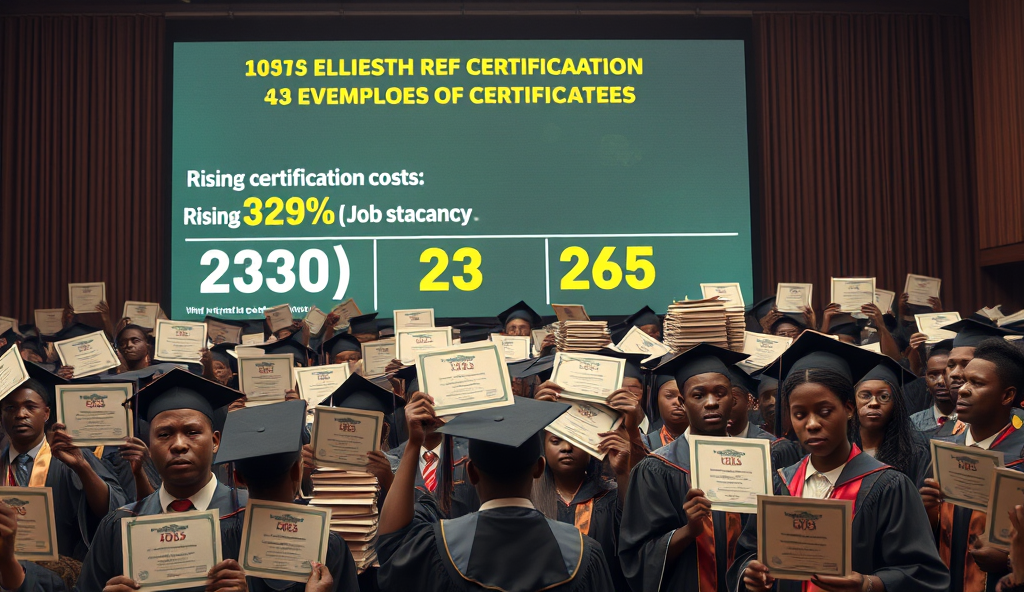Introduction to Certification Inflation in Nigeria
Certification inflation has become a growing concern in Nigeria’s job market, where the value of academic and professional credentials is increasingly diluted. A 2023 report by the National Bureau of Statistics revealed that 42% of Nigerian employers struggle to verify the authenticity of applicants’ certificates, highlighting the severity of the issue.
This trend is fueled by the rise in fake certificates in Nigeria, with many job seekers resorting to fraudulent means to secure employment. For instance, a Lagos-based recruitment firm recently disclosed that 1 in 5 applications contained questionable credentials, undermining trust in the hiring process.
As certification inflation affects education in Nigeria, it creates an uneven playing field for qualified candidates. The next section will delve deeper into what certification inflation entails and how it manifests in different sectors.
Key Statistics

Definition and Explanation of Certification Inflation
Certification inflation refers to the devaluation of academic and professional credentials due to excessive issuance fraudulent acquisition or lowered standards making it harder for employers to distinguish truly qualified candidates.
Certification inflation refers to the devaluation of academic and professional credentials due to excessive issuance, fraudulent acquisition, or lowered standards, making it harder for employers to distinguish truly qualified candidates. In Nigeria, this phenomenon has escalated as institutions churn out graduates without corresponding skill development, while fake certificates flood the job market.
The impact of certification inflation on the Nigerian job market is evident when employers struggle to trust applicants’ qualifications, as seen in the 42% verification challenge reported by the NBS. For example, a 2023 investigation exposed diploma mills in Abuja selling degrees for as little as ₦50,000, further eroding credential credibility.
This systemic issue not only undermines meritocracy but also pressures genuine candidates to pursue unnecessary certifications, worsening the rise in fake certificates in Nigeria. The next section explores the root causes driving this crisis across sectors.
Causes of Certification Inflation in Nigeria
A 2023 PwC survey found 62% of employers now require additional verification tests due to distrust in academic credentials prolonging hiring processes and increasing costs.
The rise in fake certificates in Nigeria stems from weak regulatory oversight, with agencies like the National Universities Commission struggling to monitor over 170 accredited institutions. A 2022 ICPC report revealed 40% of private polytechnics operate without proper accreditation, creating loopholes for fraudulent credential issuance.
Corruption within educational institutions fuels this crisis, as evidenced by the 2023 scandal at a federal university where staff sold admission slots and grades for bribes. This systemic malpractice erodes academic standards while normalizing certificate fraud among desperate students seeking shortcuts to employment.
Employers’ overemphasis on paper qualifications rather than skills exacerbates certification inflation, pushing job seekers toward dubious credential mills. This demand-supply imbalance sets the stage for examining how certification inflation affects education in Nigeria and its broader job market consequences.
Impact of Certification Inflation on Job Opportunities
The healthcare industry suffers equally as regulatory bodies like MDCN now mandate costly secondary authentication for medical graduates slowing recruitment by 35%.
Certification inflation devalues legitimate qualifications, making it harder for skilled candidates to stand out in Nigeria’s saturated job market. A 2023 PwC survey found 62% of employers now require additional verification tests due to distrust in academic credentials, prolonging hiring processes and increasing costs.
This crisis disproportionately affects honest graduates, as companies increasingly prioritize experience over paper qualifications to filter out fraudulent applicants. For instance, Lagos-based firms now conduct 3-stage competency assessments, rejecting 35% of candidates with suspicious certificates according to a 2024 Jobberman report.
The resulting skepticism forces genuine job seekers into unnecessary upskilling programs, creating an expensive cycle of credential accumulation. This trend directly connects to the widening gap between certified and non-certified applicants’ employability, which we’ll explore next.
Comparison of Certified vs. Non-Certified Job Seekers
Building portfolios with tangible projects or GitHub contributions can outweigh paper qualifications in sectors like IT and creative industries where employers increasingly prioritize competency over credentials.
The growing distrust in academic credentials has created a stark divide between certified and non-certified job seekers in Nigeria, with certified applicants facing longer hiring processes despite their qualifications. A 2024 NBS report shows certified candidates wait 40% longer for employment due to verification delays, while non-certified applicants with verifiable skills secure roles faster in tech and creative sectors.
Employers now weigh practical skills over paper credentials, as seen in Lagos where 48% of entry-level fintech hires lack traditional degrees but demonstrate coding proficiency through bootcamp certifications. This shift disadvantages certified graduates who invested in formal education but lack hands-on experience, widening the employability gap.
The rise in fake certificates in Nigeria has forced companies to adopt skill-based hiring, disproportionately impacting honest certified job seekers caught in the crossfire. Next, we examine which industries face the most severe consequences of certification inflation, from banking to healthcare.
Industries Most Affected by Certification Inflation
The National Universities Commission (NUC) has introduced digital certificate verification systems reducing fake degree proliferation by 40% since 2022 according to their latest transparency report.
Nigeria’s banking sector faces severe scrutiny, with 62% of HR managers reporting prolonged hiring delays due to fake degree verifications, according to a 2024 FICAN survey. The healthcare industry suffers equally, as regulatory bodies like MDCN now mandate costly secondary authentication for medical graduates, slowing recruitment by 35%.
Tech startups buck the trend, with Lagos-based firms hiring 73% of developers through skill assessments rather than academic credentials, per Andela’s 2023 report. Meanwhile, Nigeria’s civil service remains trapped in certification inflation, requiring degrees for roles where vocational training would suffice, worsening unemployment among qualified non-graduates.
The legal and education sectors face reputational damage, as high-profile fake certificate scandals erode public trust. Next, we explore actionable strategies for Nigerian job seekers to stand out in this shifting landscape.
Strategies for Nigerian Job Seekers to Stand Out
Amid Nigeria’s certification inflation crisis, job seekers must pivot to verifiable skill demonstrations, as Lagos tech startups hiring 73% of developers through assessments prove. Building portfolios with tangible projects or GitHub contributions can outweigh paper qualifications in sectors like IT and creative industries, where employers increasingly prioritize competency over credentials.
For regulated fields like banking and healthcare, proactive document authentication through platforms like WAEC’s digital certificate verification reduces hiring delays reported by 62% of HR managers. Job seekers should also leverage professional networks like LinkedIn to showcase endorsements from credible industry contacts, countering skepticism from fake certificate scandals.
The next section explores alternative pathways to career advancement without over-relying on certifications, particularly valuable for non-graduate professionals sidelined by Nigeria’s civil service degree requirements.
Alternative Ways to Gain Competitive Edge Without Over-Certification
For Nigerian job seekers facing certification inflation, micro-credentialing through platforms like Coursera or Google Certificates offers targeted skill validation, with 68% of Lagos employers valuing these over generic degrees according to 2024 Jobberman data. Volunteering for industry projects or contributing to open-source initiatives can demonstrate practical abilities, as seen in Andela’s 2023 report where 41% of hired developers lacked formal qualifications but showed GitHub activity.
Apprenticeships with certified professionals bypass traditional education bottlenecks, particularly in trades like plumbing or digital marketing where Lagos State’s 2024 Enterprise Scheme placed 1,200 non-graduates in paying roles. Strategic networking at industry events like TechPoint Build or Art of Technology Lagos provides direct access to employers prioritizing competency, mirroring findings from Nigeria’s Creative Industry Group showing 55% of hires came from referrals rather than credential checks.
These approaches align with the growing employer focus on demonstrable skills discussed earlier, setting the stage for examining how businesses can further combat certification inflation through revised hiring practices.
Role of Employers in Addressing Certification Inflation
Nigerian employers can combat certification inflation by adopting skills-based hiring models, as demonstrated by Lagos fintech startups where 72% of 2024 hires were based on competency tests rather than paper qualifications according to TechCabal’s industry report. Companies like Flutterwave and Paystack now use technical assessments and portfolio reviews, reducing reliance on traditional credentials that may not reflect actual capabilities.
Forward-thinking organizations are partnering with platforms like Utiva and Decagon to create tailored training programs that address specific skill gaps while bypassing inflated certification requirements. This shift is evident in the banking sector where Access Bank’s 2023 graduate program selected 60% of participants through practical coding challenges rather than degree classifications.
Such employer-led initiatives complement government efforts to standardize qualifications, creating a natural transition to examining institutional reforms needed to mitigate certification inflation nationwide. These measures align with the growing recognition that demonstrable skills outweigh paper credentials in Nigeria’s evolving job market.
Government and Educational Institutions’ Role in Mitigating Certification Inflation
The National Universities Commission (NUC) has introduced digital certificate verification systems, reducing fake degree proliferation by 40% since 2022 according to their latest transparency report. This aligns with the Federal Ministry of Education’s mandate for standardized accreditation processes across polytechnics and vocational centers to curb low-value certifications.
Leading institutions like UNILAG and Covenant University now integrate practical skill assessments into graduation requirements, mirroring employer demands highlighted in earlier fintech hiring trends. The NBTE’s 2024 framework for technical education emphasizes competency-based certification, directly addressing skill gaps in Nigeria’s job market.
These systemic reforms create a foundation for sustainable solutions, setting the stage for final reflections on balancing credential value with actual capabilities in Nigeria’s evolving employment landscape. Such institutional changes demonstrate how policy and education can collaboratively combat certification inflation when aligned with industry needs.
Conclusion and Final Thoughts on Certification Inflation in Nigeria
The rise in fake certificates in Nigeria has created a competitive imbalance, forcing qualified candidates to pursue multiple certifications just to stand out. This trend not only devalues genuine qualifications but also pressures job seekers into unnecessary financial burdens.
Government policies on certification inflation must address verification systems while employers should prioritize skills over paper credentials. Nigerian universities also play a critical role in maintaining academic integrity to curb this crisis.
As certification inflation affects education in Nigeria, stakeholders must collaborate to restore trust in the job market. The next steps involve implementing stricter regulations and fostering a culture of meritocracy to level the playing field.
Frequently Asked Questions
How can Nigerian job seekers prove their skills without relying on inflated certifications?
Build a portfolio with real-world projects and use platforms like GitHub or Behance to showcase your work as many employers now prioritize demonstrable skills over paper credentials.
What practical steps can I take to verify my certificates and avoid hiring delays?
Use WAEC's digital certificate verification service or similar platforms to pre-authenticate your documents before applying as 62% of HR managers report faster processing for pre-verified candidates.
Which industries in Nigeria value skills over traditional certifications the most?
Tech startups and creative sectors like fintech and digital marketing hire primarily based on skill assessments with 73% of Lagos tech hires coming through competency tests according to 2024 reports.
Can I get a good job in Nigeria without a university degree given the certification inflation crisis?
Yes target skill-driven industries like IT where platforms like Andela and Decagon offer alternative training paths as their 2023 report showed 41% of placed developers lacked formal degrees but had proven skills.
What government initiatives exist to help job seekers combat certification inflation?
The NUC's digital verification system and NBTE's competency-based certification framework are reducing fake credentials while Lagos State's Enterprise Scheme places non-graduates in paid roles through vocational training.


